Last Updated on June 8, 2023 by Admin

For your Signature Assignment, create a PowerPoint presentation that discusse
For your Signature Assignment create a PowerPoint presentation that discusses any five legal issues or ethical concepts of your choice that you feel are particularly important to the improvement of healthcare. Explain the impact of these five concepts on nursing practice, the healthcare institution, and on the quality of patient care.
For your presentation:
- Select at least four (4) legal issues or ethical concepts that you feel influence or hinder nursing practice, healthcare institutions or quality patient outcomes.
- Explain how the selected legal issues or ethical concepts impact nursing practice, the healthcare institution, and the quality of patient outcomes.
- Develop a policy proposal with measures and recommendations that could positively impact nursing practice, allow healthcare institutions to thrive, and improve the quality of patient outcomes.
- Detail how nursing could act or advocate to incorporate the policy proposal into practice.
Review the Signature Assignment Rubric before starting your presentation.
Assignment Expectations
Length: 16-20 slides minimum; answers must thoroughly address the questions in a clear, concise manner.
Structure:
Title: 1 slide
Objectives: 1 slide
List legal issues or ethical concepts: 1 slide
Explain the issues or concepts: at least 4 – 5 slides
Present a policy proposal incorporating the issues and concepts with measures and recommendations: at least 5 slides
Explain how nursing can act or advocate to incorporate the policy proposal into practice: 1-5 slides
Conclusion: 1 slide
References: 1 slide
Additionally, because a good presentation has few words on the slides include a script with the verbiage you would say when presenting; script should be a minimum of 50 words per slide.
References: Use the appropriate APA style in-text citations and references for all resources utilized to answer the questions. Include at least four (4) scholarly sources to support your claims, at least one (1) per legal issue or ethical concept in addition to required texts.
Format: Save your assignment as a Microsoft PowerPoint document and a Word document (.pptx) and (.doc or .docx) or Open Office Impress.
File name: Name your saved file according to your first initial, last name, and the module number (for example, “RHall Module1.pptx”).
Additionally, because a good presentation has few words on the slides include a script with the verbiage you would say when presenting; script should be a minimum of 50 words per slide.
Expert Answer and Explanation
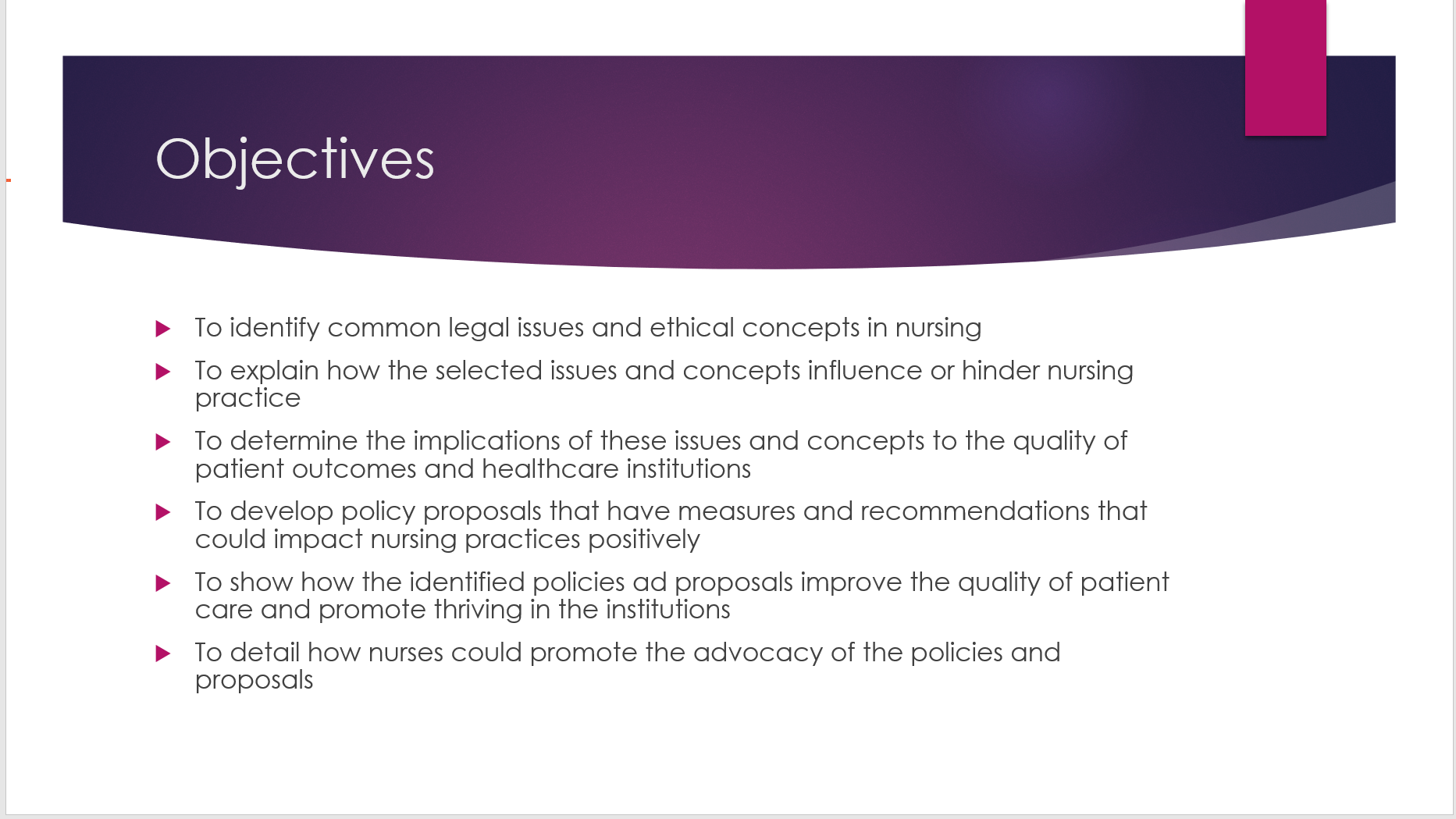
- The core goal of this assignment is to identify common legal issues and ethical concepts in nursing and to explain how the selected issues and concepts influence or hinder nursing practice.
- Also, the presentation seeks to determine the implications of these issues and concepts to the quality of patient outcomes and healthcare institutions, to develop policy proposals that have measures and recommendations that could impact nursing practices positively, and to show how the identified policies ad proposals improve the quality of patient care and promote thriving in the institutions

- The common ethical and legal issues in nursing include Malpractice and Negligence; Patient confidentiality; Informed consent; DNR orders; Physician-assisted Suicide; Access to care
- Each of these issues affect the ability of physicians to deliver quality care to the patients, while respecting the idea of patient-centered and holistic care. Other ethical issues that may not be discussed in detail herein include Equity of Resources, Conflict of Interest, Ethics of Privatization, Opposite sex issues, and Patient Rights

- Patient confidentiality is one of the core ethical issues in the nursing settings, and it mainly affects some stakeholders such as patients, nurses, and patient families (Dove et al., 2019). Doctors who violate patient confidentiality could have legal consequences.
- The Health Insurance Portability and Accountability Act (HIPPA) requires healthcare givers to protect the security and privacy of medical records of patients
- However, gray areas in the HIPPA such as the idea of having more harm after failing to disclose the patient information could lead to loopholes in the issue
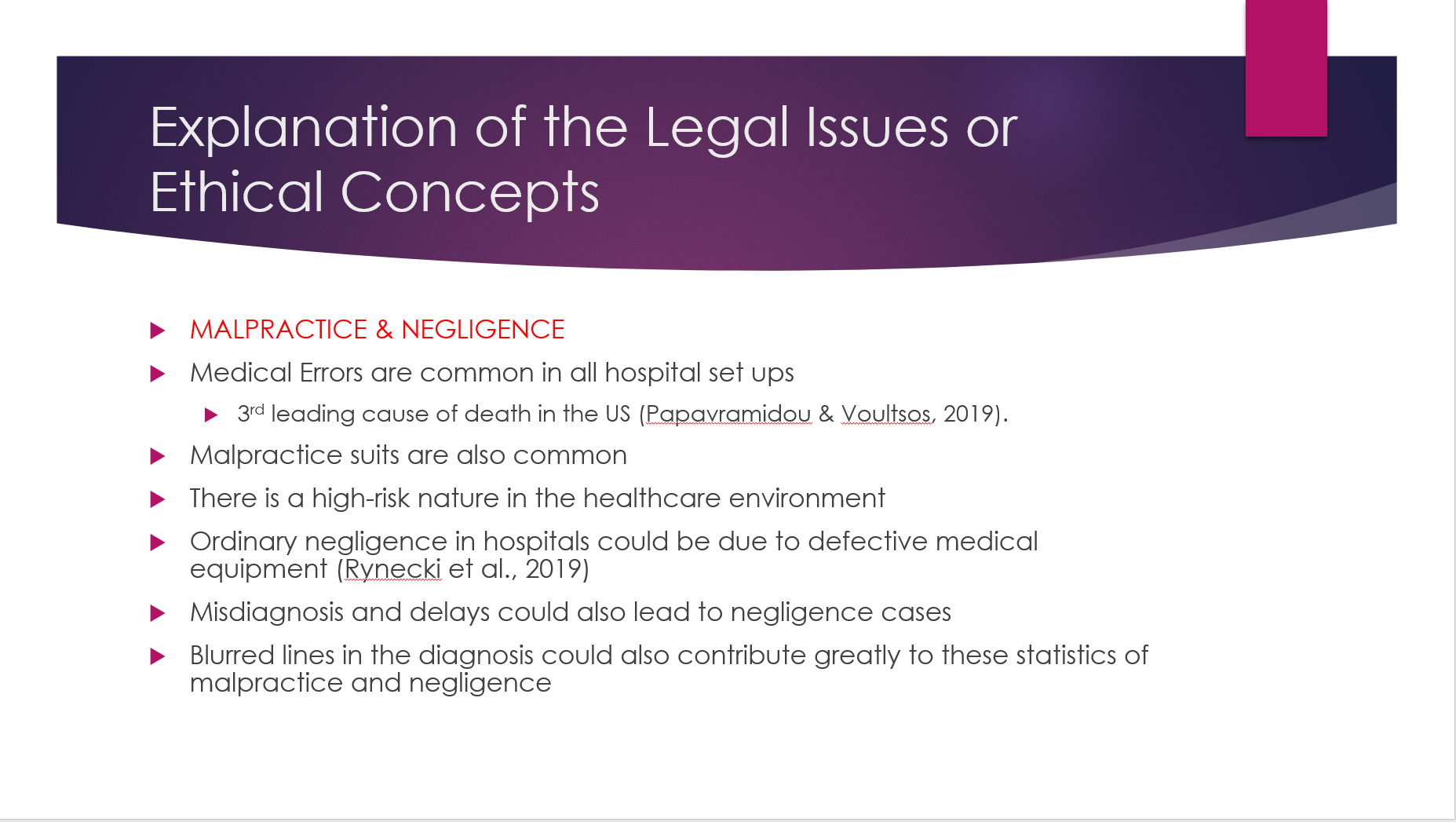
- Medical malpractices and negligence among healthcare givers is one of the ways in which individuals get medical errors. Medical errors, on the other hand, are common in all hospitals and in the US, they serve as the third leading cause of death, which makes it an issue of urgency (Papavramidou & Voultsos, 2019).
- In some of the facilities, negligence is cased by the absence of the proper tools of care, where the physicians can barely work to the patient expectations because of things such as delays in diagnosis and also defective medical equipment (Rynecki et al., 2019).
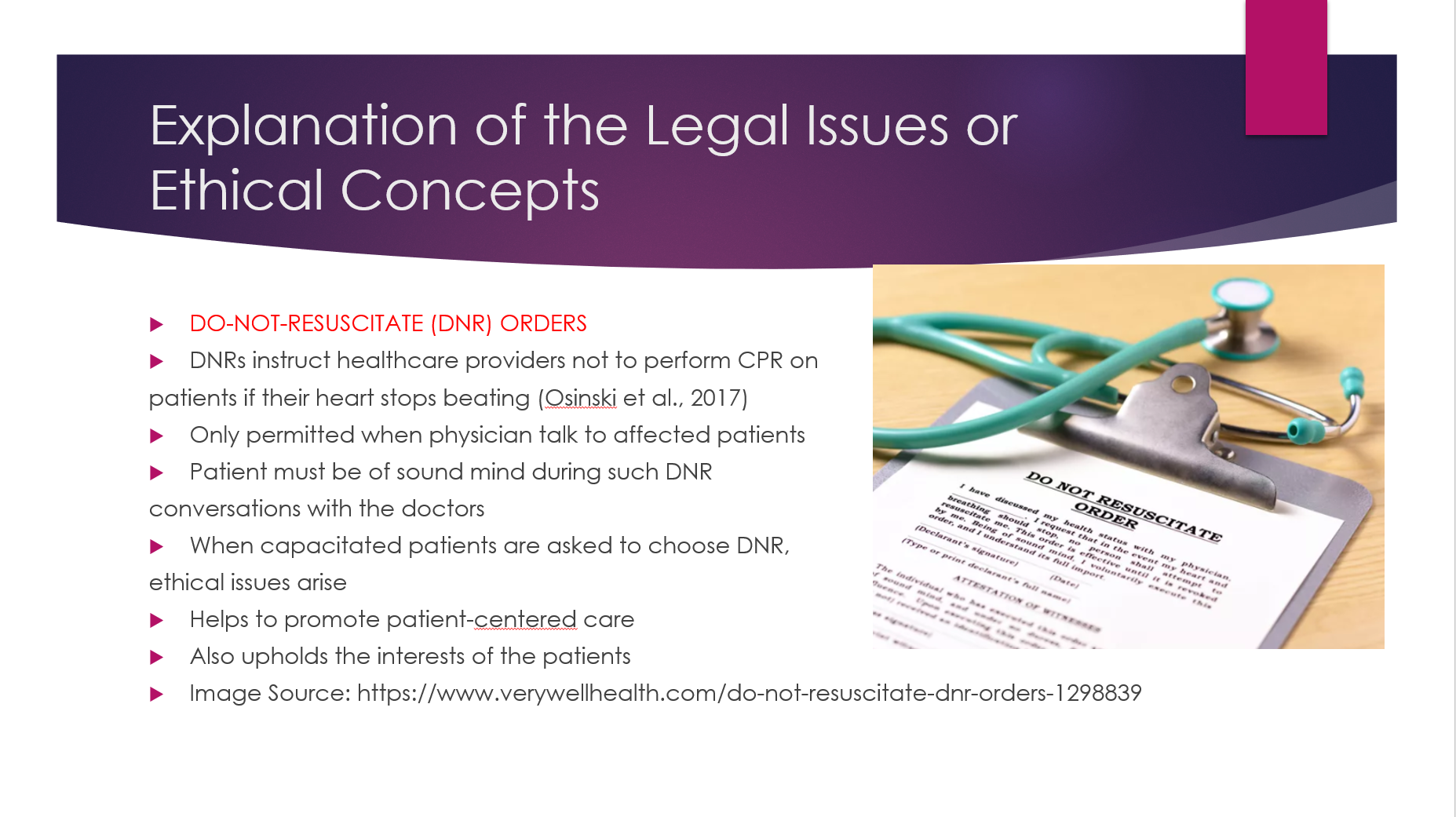
- Do-Not-Resuscitate (DNR) orders instruct healthcare providers not to perform CPR on patients if their heart stops beating. Patients who perform such requests have the intention of reducing the amount of suffering they may have to face if they are allowed to live in critical condition (Osinski et al., 2017).
- Accepting DNR orders is a way of patient-centered care as it upholds the individual patient interests. When capacitated patients are asked to choose DNR, there are numerous ethical issues that arise, and the physicians involved could face prosecution
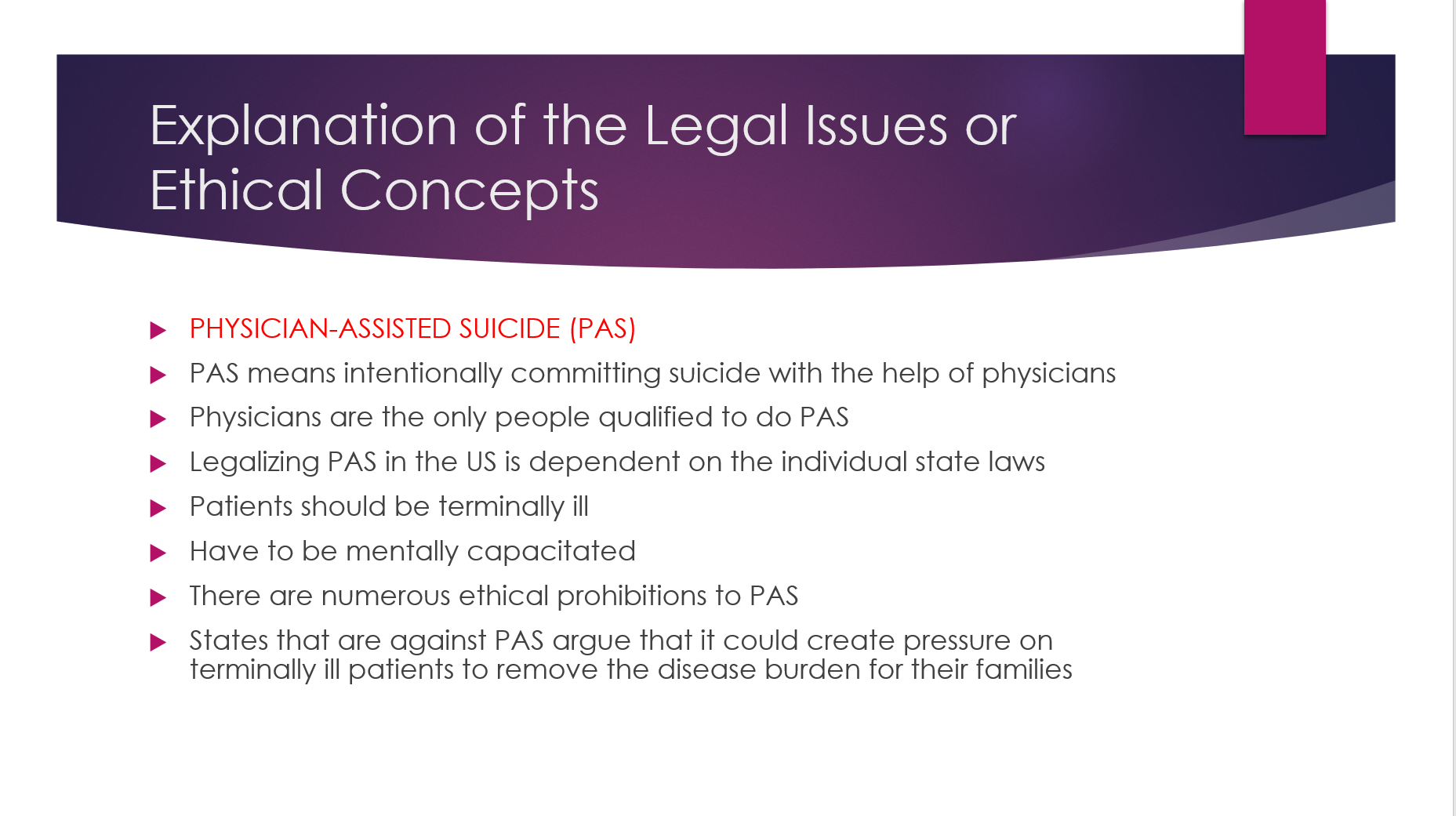
- Physician Assisted Suicide refers to the action of physicians helping terminally-ill patients to end their life by things such as removing life support during their stay in the hospital.
- Legalizing PAS in the US is dependent on the individual state laws. One of the conditions in the PAS is that the patients should be terminally ill, and those who have acute illnesses that are disturbing have to receive extensive scrutiny before the PAS. An ethical issue that arises in PAS is that States that are against PAS argue that it could create pressure on terminally ill patients to remove the disease burden for their families.
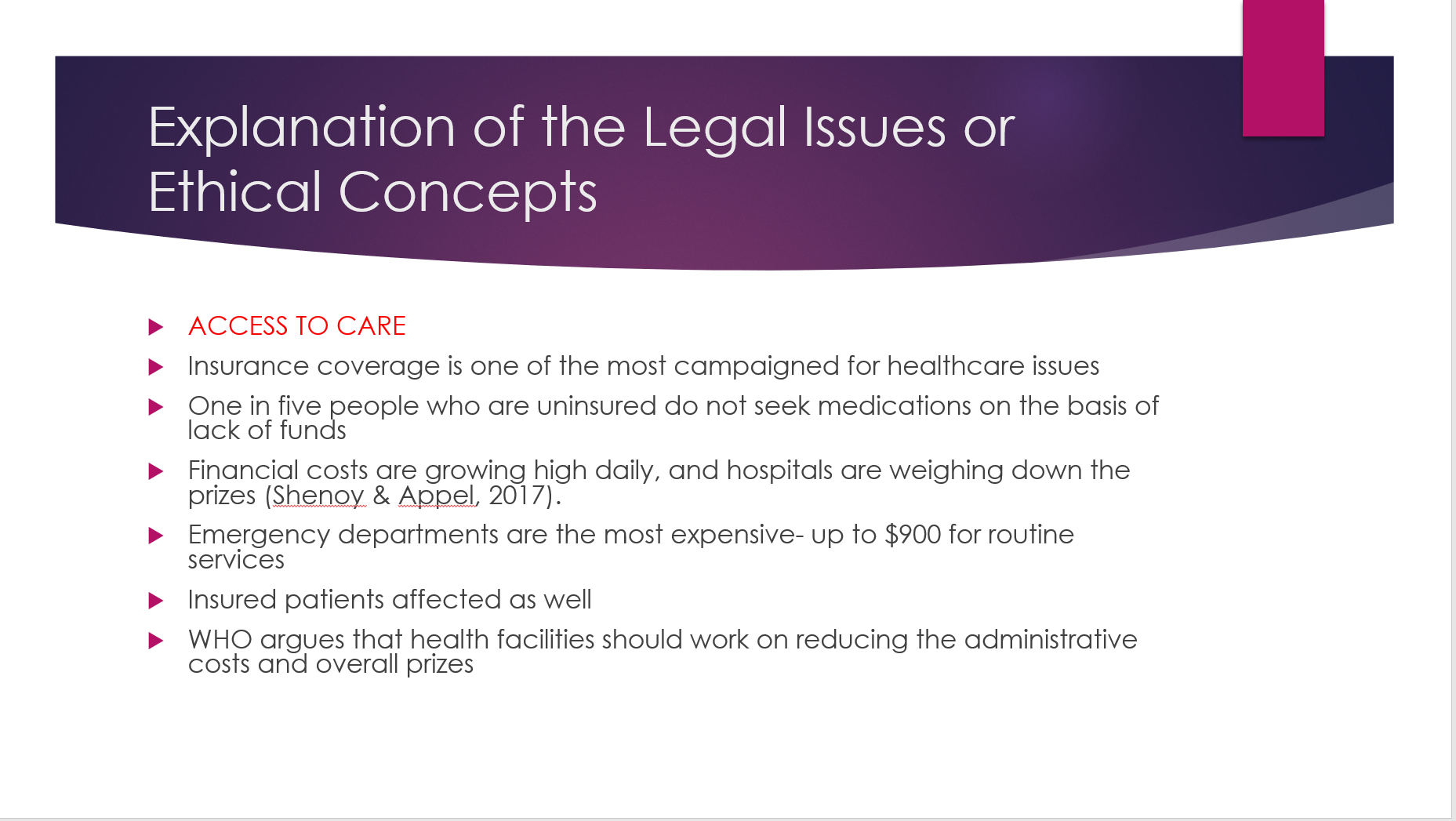
- Access to care is a common issue that faces patients, especially those from vulnerable communities such as homeless individuals. Insurance coverage is one of the most campaigned for healthcare issues (Shenoy & Appel, 2017). One in five people who are uninsured do not seek medications on the basis of lack of funds, and this is a worrying statistic
- Emergency departments, on the other hand, are expensive for all patients who are not insured, as the basic routine care could cost them over $900. the WHO argues that health facilities should work on reducing the administrative costs and overall prizes.
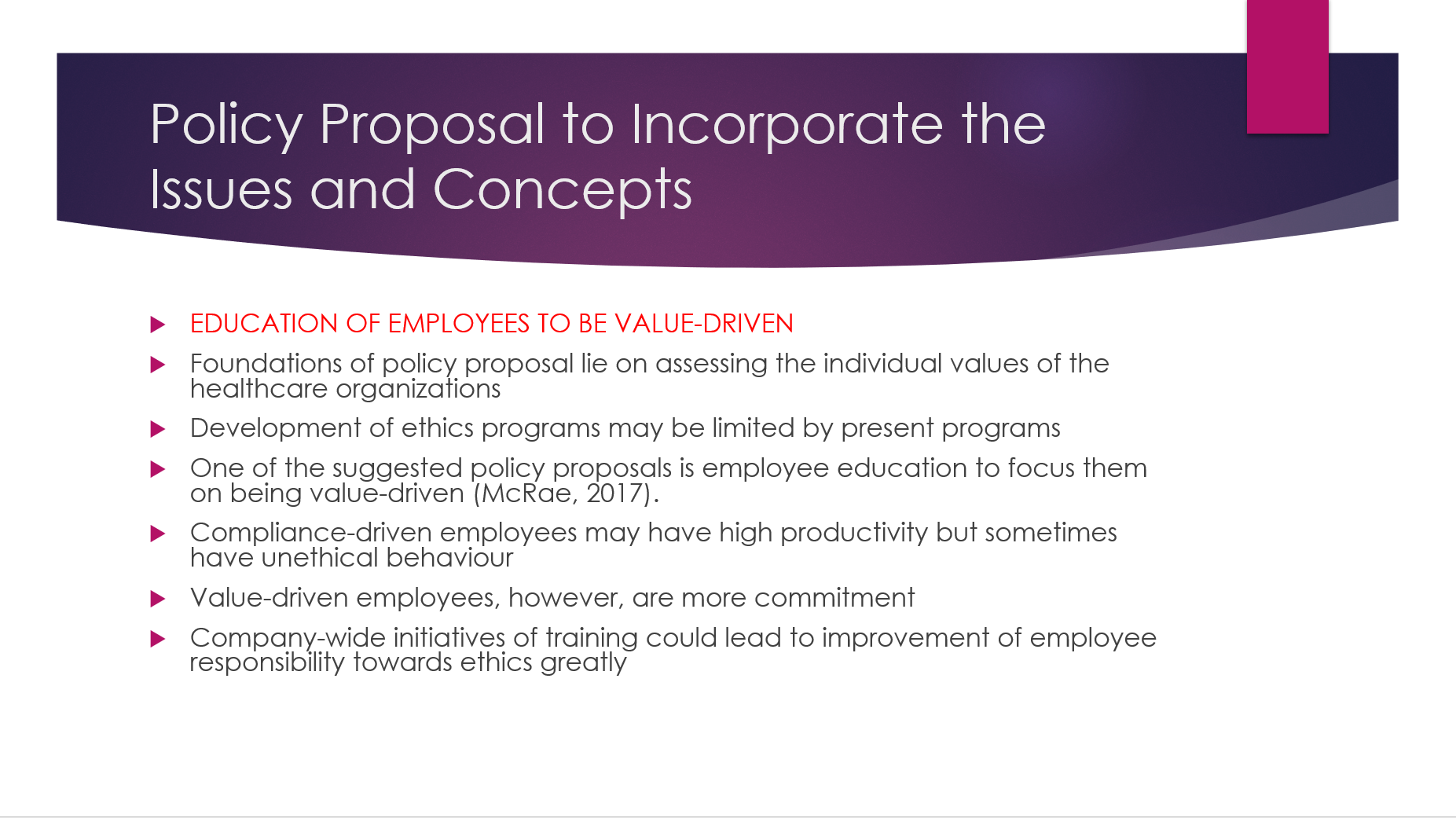
- Policy changes are the solution to solving the challenges associated with the issues and concepts. Foundations of policy proposal lie on assessing the individual values of the healthcare organizations (McRae, 2017). The development of ethics programs may be limited by present programs. One of the suggested policy proposals is employee education to focus them on being value-driven
- Value-driven employees, unlike compliance-driven, show commitment to upholding the ethical values and standards they encounter.

- Besides employee education, the creation of advocacy avenues for nurses is among the most powerful ways in which the ethical and legal issues can be incorporated in policy
- For instance, nurses should be aware of the different ways in which they can participate directly in advocacy. Employee open forums, for instance, could be beneficial in incorporating the issues and concepts. Response teams should be designed to improve the compliance loopholes identified
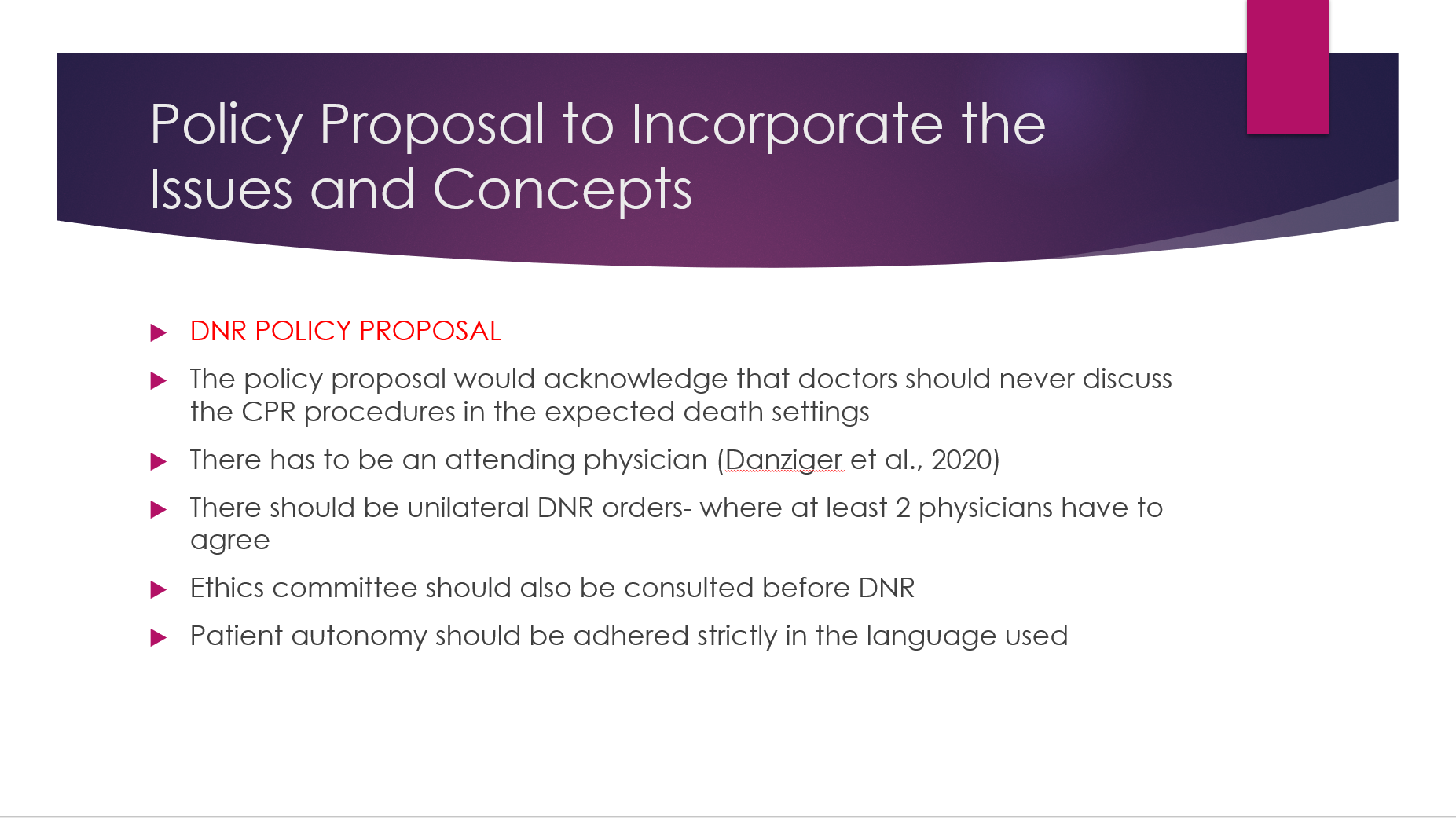
- For the Do-not-resuscitate (DNR) issues, the policy proposal would acknowledge that doctors should never discuss the CPR procedures in the expected death settings (Danzinger et al., 2020). The policy should also emphasize on the need to have an attending physician to perform or oversee the operation
- Also, there should be unilateral DNR orders- where at least 2 physicians have to agree before the action or an ethics committee, all of which would serve to increase the surelty of the underlying facts.
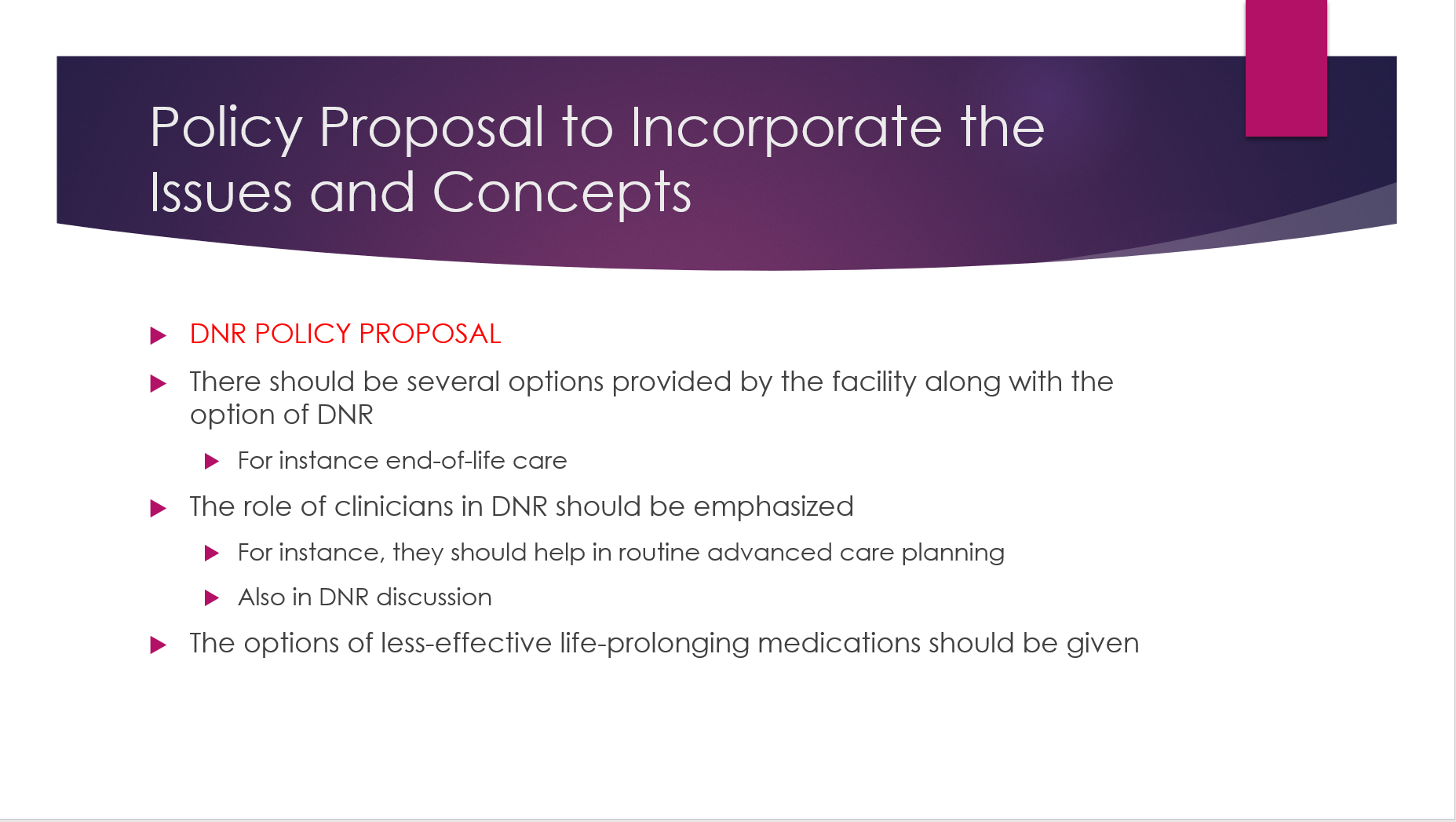
- To reduce the chances of loopholes in the DNR, a policy should propose the several options that are provided by the facility along with the options for the DNR, such as the proposal to have end of life care
- The role of clinicians in DNR should be emphasized. For instance, they should help in routine advanced care planning. Lastly, the options of less-effective life-prolonging medications should be given
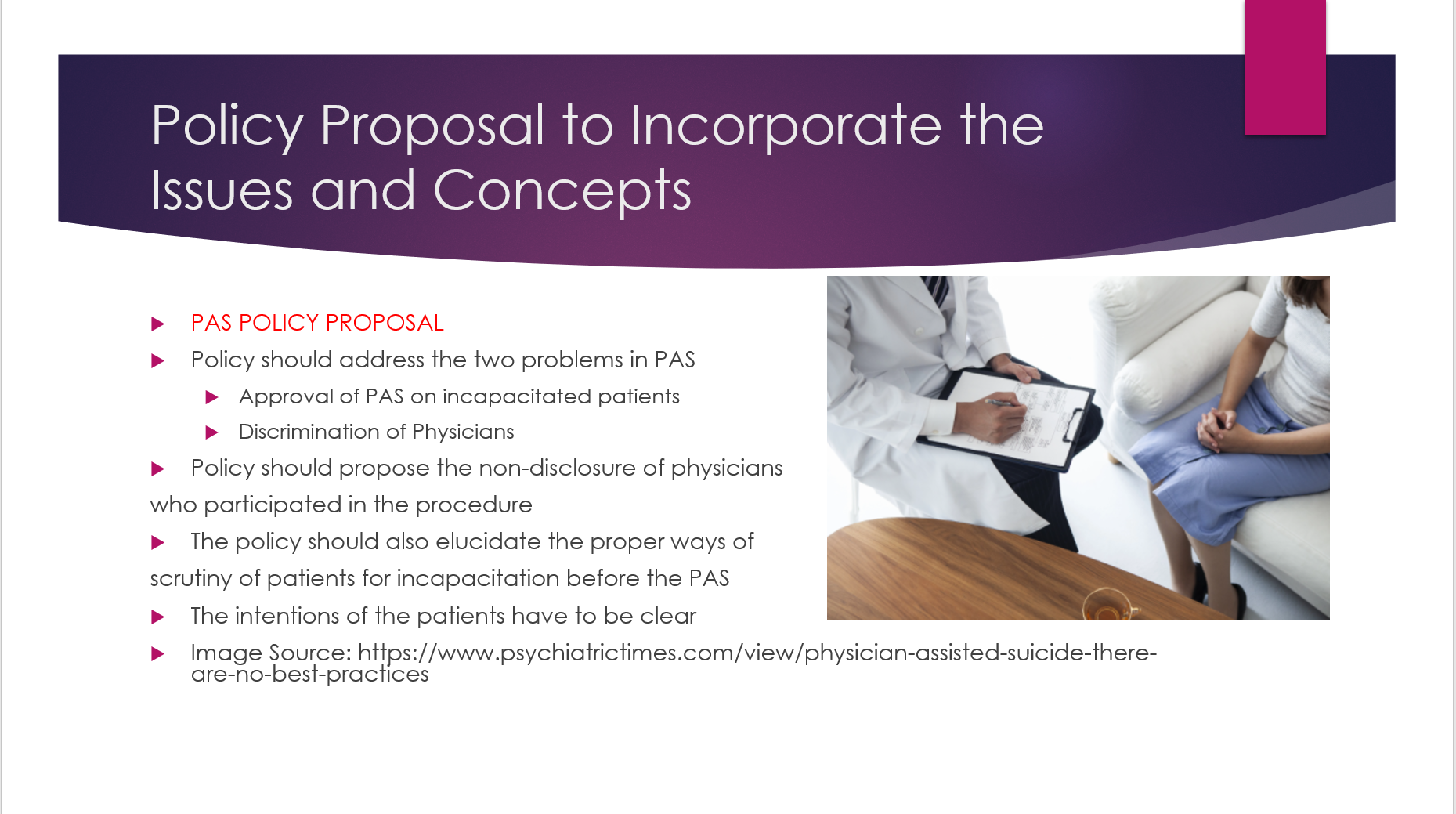
- Like DNR, physician-assisted suicide is a sensitive topic, and the two common problems that are associated with it include approval of PAS on incapacitated patients and the discrimination of physicians
- Policy should propose the non-disclosure of physicians who participated in the procedure. Also, the policy should also elucidate the proper ways of scrutiny of patients for incapacitation before the PAS
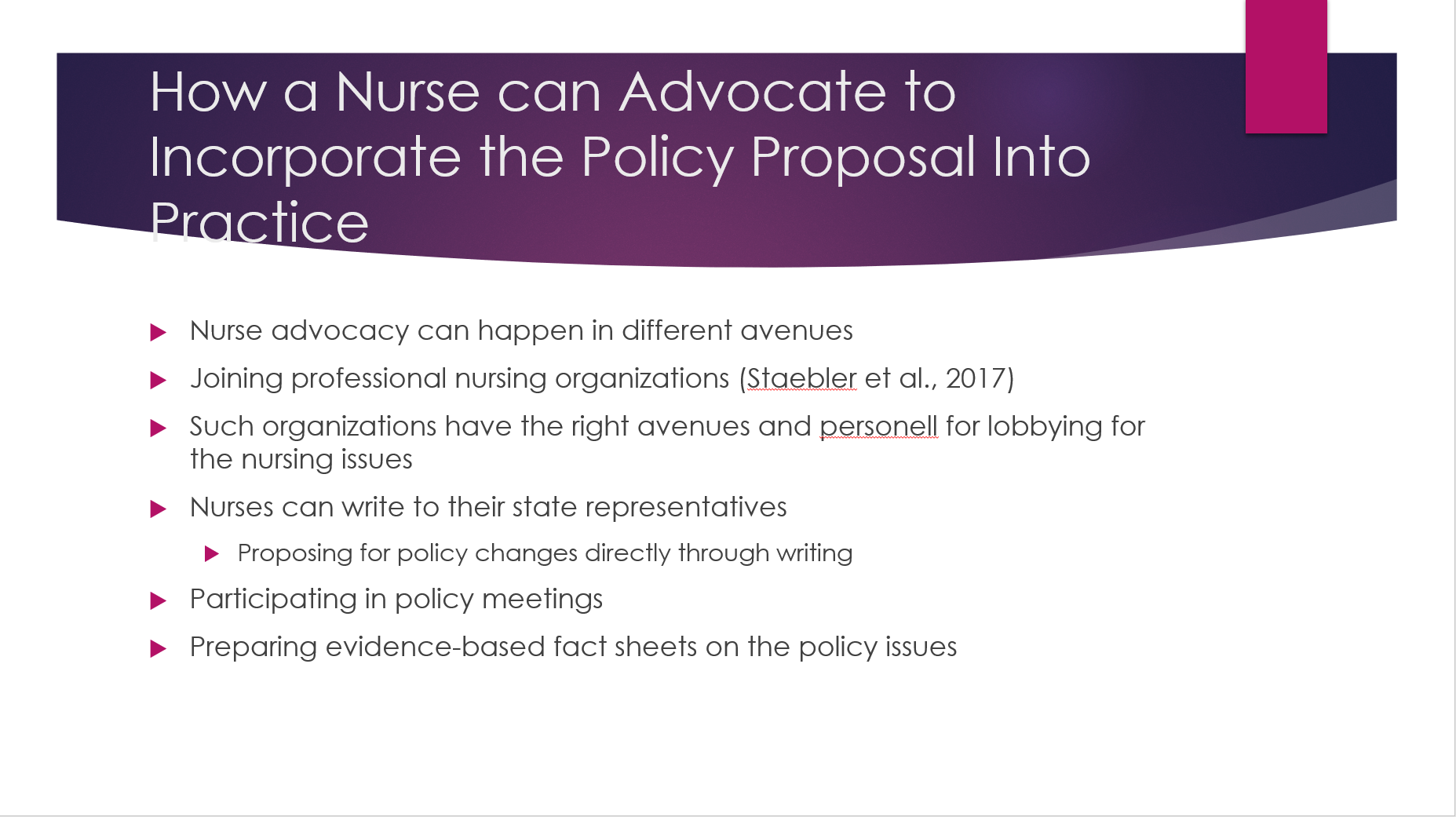
- Nurses are the best advocates for patient healthcare issues as they have a stronger connection with patients through spending more time with them in their day to day care. Among the common ways in which nurse advocacy can happen is by joining professional organizations, where there would be proper personnel and avenues for lobbying for the nursing issues that involve legal issues and ethics (Staebler et al., 2017)
- Nurses can also write to their state representatives and also participate in policy meetings, where they should have evidence-based fact sheets that support the policy issues they propose
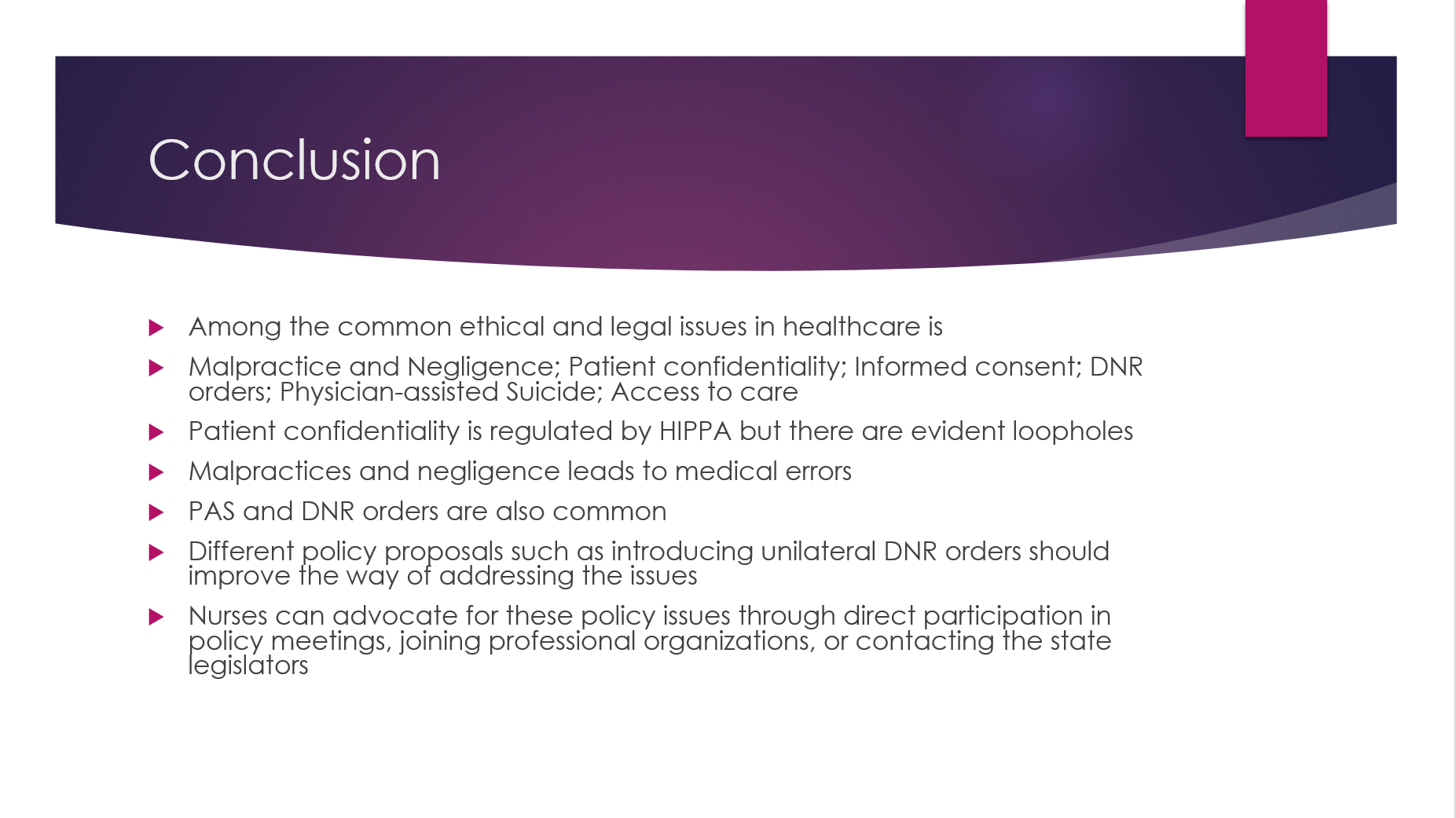
- Healthcare is faced by different ethical and legal issues including but not limited to Malpractice and Negligence; Patient confidentiality; Informed consent; DNR orders; Physician-assisted Suicide; and Access to care.
- Patient confidentiality is regulated by HIPPA but there are evident loopholes. Different malpractices and negligence leads to medical errors, and these can be regulated from the source points. Different policy proposals such as introducing unilateral DNR orders should improve the way of addressing the issues
- Nurses can also advocate for these policy issues through direct participation in policy meetings, joining professional organizations, or contacting the state legislators
References
Danziger, J., de la Hoz, M. Á. A., Celi, L. A., Cohen, R. A., & Mukamal, K. J. (2020). Use of Do-Not-Resuscitate Orders for Critically Ill Patients with ESKD. Journal of the American Society of Nephrology, 31(10), 2393-2399. Doi: https://doi.org/10.1681/ASN.2020010088
Dove, E. S., Chico, V., Fay, M., Laurie, G., Lucassen, A. M., & Postan, E. (2019). Familial genetic risks: how can we better navigate patient confidentiality and appropriate risk disclosure to relatives?. Journal of medical ethics, 45(8), 504-507. http://dx.doi.org/10.1136/medethics-2018-105229
McRae, S. L. (2017). Transforming leadership for patient satisfaction. The Journal of Excellence in Nursing Leadership, 48(2), 51-54. Doi: 10.1097/01.NUMA.0000511923.13387.69
Papavramidou, N., & Voultsos, P. (2019). Medical malpractice cases in Hippocratic collection: a review and today’s perspective. Hippokratia, 23(3), 99. https://www.ncbi.nlm.nih.gov/pmc/articles/PMC7307500/
Osinski, A., Vreugdenhil, G., de Koning, J., & van der Hoeven, J. G. (2017). Do-not-resuscitate orders in cancer patients: a review of literature. Supportive Care in Cancer, 25(2), 677-685. https://doi.org/10.1007/s00520-016-3459-9
Rynecki, N. D., Coban, D., Gantz, O., Gupta, R., Ayyaswami, V., Prabhu, A. V., … & Beebe, K. S. (2018). Medical malpractice in orthopedic surgery: a Westlaw-based demographic analysis. Orthopedics, 41(5), e615-e620. https://doi.org/10.3928/01477447-20180621-06
Shenoy, A., & Appel, J. M. (2017). Safeguarding confidentiality in electronic health records. Cambridge Q. Healthcare Ethics, 26, 337. https://heinonline.org/HOL/LandingPage?handle=hein.journals/cqhe26&div=41&id=&page=
Staebler, S., Campbell, J., Cornelius, P., Fallin-Bennett, A., Fry-Bowers, E., Kung, Y. M., … & Miller, J. (2017). Policy and political advocacy: Comparison study of nursing faculty to determine current practices, perceptions, and barriers to teaching health policy. Journal of Professional Nursing, 33(5), 350-355. https://doi.org/10.1016/j.profnurs.2017.04.001
Place your order now for the similar assignment and get fast, cheap and best quality work written by our expert level assignment writers.
Use Coupon Code: NEW30 to Get 30% OFF Your First Order
Related Answered Questions
[SOLVED] Sabrina is a 26 year old female who has just been
SOLVED! An 83-year-old resident of a skilled nursing
SOLVED!! Describe the clinical manifestations present in
What are some strategies you can use to help clients
SOLVED!! Develop 3–4 new SMART goals for this quarter and
[ANSWERED] What is the significance of the product lifecycle
ANSWERED! In this project you will select an organization or
Legal and Ethical Issues in Midwifery
Introduction
Midwifery is a profession that plays a crucial role in providing care and support to women during pregnancy, childbirth, and postpartum. However, like any healthcare practice, midwifery is not without its legal and ethical considerations. This article explores the legal and ethical issues that arise in midwifery, highlighting their significance and impact on both healthcare providers and patients.
Understanding Midwifery: Definition and Role
Before delving into the legal and ethical aspects, it is essential to understand the definition and role of midwifery. Midwives are skilled healthcare professionals who provide comprehensive care to women, promoting healthy pregnancies and facilitating safe childbirth. They emphasize a holistic approach, focusing on the physical, emotional, and social well-being of the mother and her baby.
Legal Issues in Midwifery
-
Licensing and Certification
Licensing and certification requirements vary across jurisdictions, and midwives must ensure they meet the legal criteria to practice. These regulations often include educational qualifications, clinical experience, and passing standardized exams. Failure to comply with licensing requirements can lead to legal consequences and compromise patient safety.
-
Scope of Practice
Midwives operate within a defined scope of practice, which outlines the specific procedures and interventions they are authorized to perform. Deviating from this scope can result in legal ramifications and potential harm to patients. It is crucial for midwives to understand and adhere to their scope of practice to ensure the provision of safe and appropriate care.
-
Informed Consent and Decision-Making
Respecting patient autonomy and obtaining informed consent is an ethical and legal obligation for midwives. This involves providing patients with relevant information about their options, benefits, risks, and alternatives, allowing them to make decisions based on their individual circumstances. Failure to obtain informed consent can lead to legal claims and ethical concerns.
Ethical Issues in Midwifery
-
Autonomy and Patient Rights
Respecting patient autonomy is a cornerstone of ethical healthcare practice. Midwives must recognize and support a woman’s right to make decisions about her own body and reproductive choices. This includes respecting her choices regarding birthing plans, pain management, and postpartum care.
-
Confidentiality and Privacy
Maintaining patient confidentiality is essential in midwifery practice. Midwives must ensure that patient information remains private and protected from unauthorized access. Respecting privacy builds trust and allows women to share sensitive information without fear of judgment or breaches of confidentiality.
-
Cultural Sensitivity and Diversity
Midwives provide care to women from diverse cultural backgrounds. Ethical midwifery practice requires cultural sensitivity, understanding, and respect for cultural beliefs, practices, and preferences. By embracing diversity and promoting culturally competent care, midwives can foster positive birth experiences for all women.
-
Informed Choice and Shared Decision-Making
Midwives have a responsibility to empower women through informed choice and shared decision-making. This involves providing comprehensive and unbiased information, discussing all available options, and supporting women in making decisions aligned with their values and preferences.
Ethical Issues in Obstetrics: Examples and Challenges
-
Maternal-Fetal Conflict
Maternal-fetal conflict arises when the best interests of the mother and the fetus come into conflict. Ethical dilemmas may occur when decisions need to be made that prioritize either the health and well-being of the mother or the fetus. Midwives play a vital role in navigating these complex situations while considering the ethical principles of beneficence, autonomy, and justice.
-
Reproductive Technology and Assisted Reproductive Procedures
Advancements in reproductive technology have raised ethical questions in obstetrics. Midwives may face dilemmas related to practices such as in vitro fertilization, preimplantation genetic diagnosis, and surrogacy. These issues require careful consideration of the ethical implications and the well-being of all involved parties.
-
Management of High-Risk Pregnancies
High-risk pregnancies present unique challenges for midwives. Ethical issues may arise when determining appropriate interventions, balancing the well-being of the mother and the fetus, and respecting the woman’s autonomy. Midwives must navigate these complexities while upholding ethical standards and collaborating with other healthcare professionals.
-
End-of-Life Care and Ethical Dilemmas
End-of-life care decisions can be emotionally and ethically challenging for midwives. When faced with situations involving a terminally ill mother or a baby with a life-limiting condition, midwives must navigate complex ethical considerations. Supporting families through these difficult moments requires compassion, sensitivity, and ethical decision-making.
Ethics in Legal Research: Importance and Considerations
Legal research plays a vital role in shaping and refining the laws and regulations that govern midwifery practice. Conducting ethical research is essential to ensure the protection of participants and the generation of reliable and valid findings. Key considerations include:
-
Protecting Participants’ Rights
Ethical legal research requires safeguarding the rights and well-being of research participants. This includes obtaining informed consent, maintaining confidentiality, and minimizing any potential harm or discomfort.
-
Informed Consent and Voluntary Participation
Participants should have a clear understanding of the research objectives, procedures, risks, and benefits before providing consent. Voluntary participation ensures that individuals can choose whether or not to participate without coercion or undue influence.
-
Confidentiality and Anonymity
Researchers must maintain strict confidentiality and anonymity when handling participants’ data. Protecting the privacy of participants contributes to the trustworthiness of the research and respects their rights to privacy.
-
Ethical Approval and Institutional Review Boards (IRBs)
Obtaining ethical approval from an Institutional Review Board (IRB) ensures that research projects meet ethical standards. IRBs review research proposals to assess their ethical implications and ensure the protection of participants.
Balancing Legal and Ethical Considerations in Midwifery Practice
Midwives often face situations where legal requirements and ethical considerations may conflict. Balancing these aspects requires careful consideration and an integrated approach to practice. Some key strategies for navigating these challenges include:
-
Navigating Conflicting Laws and Ethical Guidelines
Midwives must stay informed about the legal requirements and ethical guidelines that apply to their practice. When faced with conflicts, seeking guidance from professional organizations, legal advisors, or ethics committees can help clarify the best course of action.
-
Integrating Personal Values with Professional Duties
Midwives bring their values and beliefs into their practice. Integrating personal values with professional responsibilities can be challenging, but it is important to prioritize patient-centered care and respect the rights and choices of women while adhering to legal and ethical standards.
-
Resolving Ethical Dilemmas and Seeking Guidance
Ethical dilemmas are inherent in midwifery practice. When confronted with complex situations, midwives should engage in ethical decision-making processes, seek input from colleagues or ethics committees, and reflect on the potential outcomes and consequences of different actions.
Conclusion
Legal and ethical issues significantly impact the practice of midwifery. Midwives must navigate complex legal frameworks and adhere to ethical principles to ensure the provision of safe, patient-centered care. By understanding these issues, midwives can effectively advocate for women’s rights, promote shared decision-making, and provide compassionate care throughout the reproductive journey.
